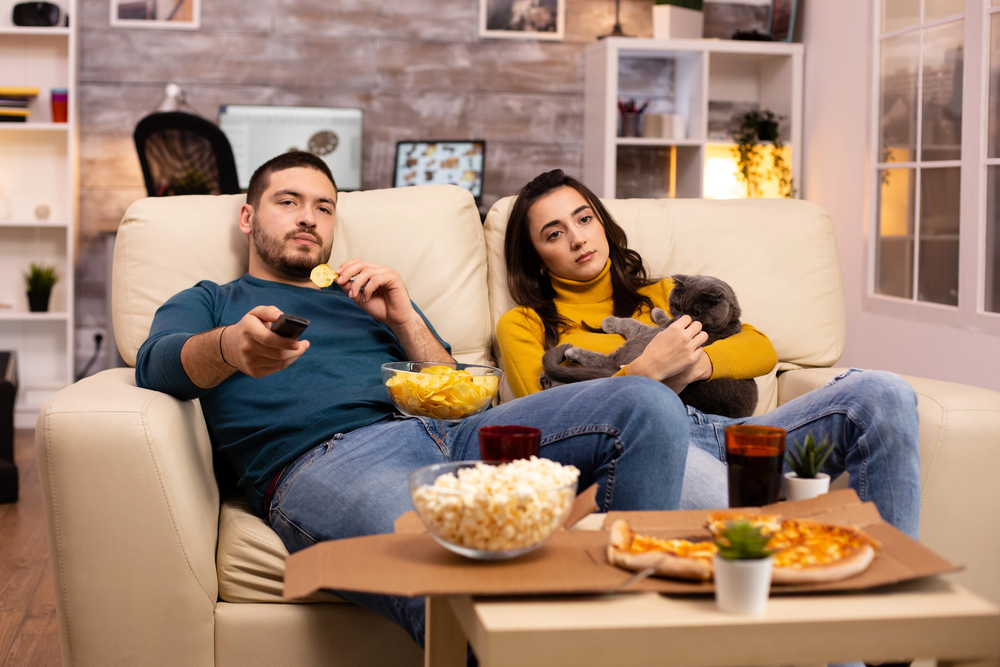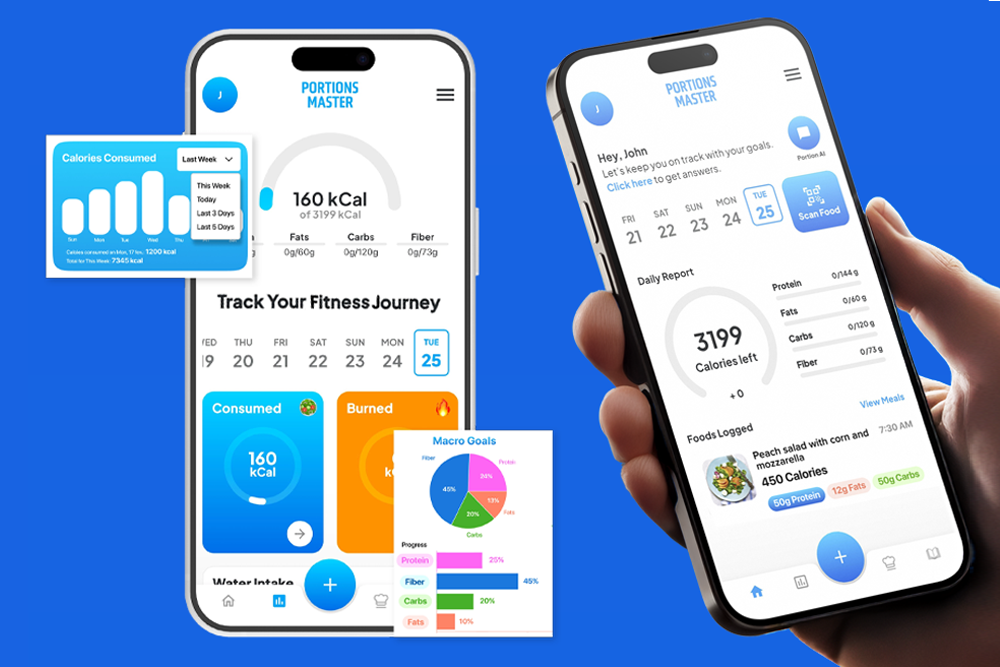Portion Control for Weight Loss
Posted by Portions Master on 4th Apr 2025
If you're trying to lose weight, portion control can be one of your most powerful tools. Managing how much you eat is just as important as what you eat. With portion sizes growing over the years, it's no surprise that many people struggle with overeating, even when they think they're making healthy choices. The good news? There are simple habits and subtle tech tools that can make portion control for weight loss easier and more effective than ever.
Why Portion Control Matters
Obesity is a growing epidemic, and increased portion sizes are a major contributor. Research shows that people tend to eat almost all of what they serve themselves. Without the right strategy, it's easy to overindulge. That's why many people are turning to intuitive eating habits and consistent routines to stay in control.
Habits to Help Control Portions
Here's how you can implement practical portion control tips into your daily life:
- Use Smaller Dinnerware
- Research shows that the size, shape, and color of your plate can influence how much you eat. Smaller, darker plates can help food appear more filling and reduce overconsumption.
- Use Your Plate as a Guide
- Try the plate method: fill half with vegetables, one-quarter with lean protein, and one-quarter with whole grains or healthy carbs. Visualizing this balance helps guide better portion control for weight loss.
- Use Your Hands as a Serving Guide
- Your hands are a great visual tool:
- Protein: palm size
- Carbs: fist size
- Veggies: two cupped hands
- Fats: thumb size
- Ask for Half Portions When Eating Out
- Restaurant portions are often double (or triple!) what you need. Ask for a half portion, split with a friend, or box up half before you begin.
- Start Meals with Water
- Drinking water 30 minutes before eating helps reduce hunger and increases feelings of fullness.
- Slow Down When Eating
- Eating too quickly often leads to overeating because your brain doesn't have enough time to register that you're full. It can take about 20 minutes for your stomach to signal to your brain that you've had enough.
- Slowing your pace not only helps you eat less but also enhances digestion and allows you to enjoy your food more. Try putting your fork down between bites, chewing thoroughly, and savoring flavors. These mindful habits help you become more in tune with your hunger and fullness cues.
Studies also show that people who eat slowly tend to consume fewer calories, feel more satisfied after meals, and have a lower body mass index (BMI) compared to fast eaters.
Tip: Eliminate distractions like TV or scrolling on your phone. Focus on your meal to build awareness and improve portion control naturally.

- Avoid Eating Straight from the Container
- Transfer snacks and meals to smaller bowls or plates to avoid mindless eating and help set boundaries around serving sizes.
- Be Aware of Suggested Serving Sizes
- Understanding recommended serving sizes for common foods can prevent you from unknowingly overeating. Reading food labels and practicing portion awareness is key.
- Track Meals and Build Awareness
- o Building meal awareness helps train your eye to recognize balanced portions and supports better choices.
Avoid Eating Too Late at Night
Eating late at night can disrupt your sleep and hinder digestion, making it harder for your body to properly process food. Here's why it's important to avoid late-night meals:
- Impacts Digestion: When you eat late, your body doesn't have enough time to fully digest food before you go to bed. This can lead to indigestion, heartburn, or acid reflux, which can interfere with sleep quality and leave you feeling uncomfortable overnight.
- Disrupts Sleep Patterns: Eating too close to bedtime raises your body's metabolism and increases blood sugar levels, making it harder to fall asleep. Foods high in fat or sugar can also cause a spike in energy, preventing you from getting restful sleep.
- Body's Natural Rhythm: Your body is designed to be less active at night, so digestion slows down. Eating late at night may confuse your circadian rhythm, which can negatively affect your sleep cycle and overall health.
- Weight Management: Eating late at night is also linked to poor weight management. Since your metabolism is slower when you're sleeping, your body is more likely to store those late-night calories as fat, making it harder to maintain a healthy weight.
Practical Tips for Avoiding Late-Night Eating:
- Set a cut-off time: Try to stop eating at least 2-3 hours before bed to give your body time to digest and settle into sleep.
- Have a light evening snack: If you're hungry, opt for a light, healthy snack that is easy to digest, like a small handful of nuts or a piece of fruit.
- Establish a bedtime routine: Keep your evenings calm and avoid triggers like watching TV or using your phone, which can lead to late-night cravings.
By allowing your body time to properly digest food and rest, you'll wake up feeling more refreshed and support your weight loss and overall wellness goals.
Tools That Support Portion Control
While many people turn to portion control containers to help manage their food intake, they often come with limitations. Not only are these containers expensive, but they also aren't always practical for people on the go. You can't always carry them around or use them at every meal, which can make sticking to your portion control goals difficult.
But there's a simpler, more convenient solution: your phone. With the Portion Master App, you can track your meals and portion sizes anywhere you go. Instead of worrying about packing containers or measuring out portions, you can simply use your phone to manage your intake in real time.
Here's how the app can help you stay on track:
- Meal Detection: Scan meals using your phone camera to get immediate feedback. It's like having a portion control expert right in your pocket.
- Visual Portion Guidance: Receive real-time recommendations on how much of each food group is just right for your goals, ensuring balanced meals without needing to guess.
- Personalized Alerts: Get tailored reminders and nudges to stay on track, so you never forget your portion goals, even during busy days.
- Meal History Tracking: Review your meal patterns over time to see where you've succeeded and where you may need to adjust, helping you stay consistent in your efforts.
- Custom Recommendations: Whether you're focused on weight loss, muscle gain, or overall health, the app adjusts to your body type, goals, and lifestyle, offering practical tips that align with your needs.
With this app, you can easily track your meal portions in real-time, helping you stay on track without the hassle of measuring containers.
What is portion control and how does it help with weight loss?
Portion control is the practice of managing how much food you eat in one sitting. It helps with weight loss by reducing excess calorie intake and improving awareness of hunger and fullness cues.
Can technology really help with portion control?
Yes! Certain tools offer guidance and tracking to make it easier to stay consistent and mindful.
Control Your Plate Without Stress
Portion control doesn't have to feel restrictive. With the right habits and gentle tech support, you can develop a sustainable approach to eating that supports your goals and fits your lifestyle.
Final Thoughts: Small Changes, Big Results
Mastering portion control for weight loss isn't about giving up your favorite foods, it's about learning to enjoy them in the right amounts. By combining mindful habits, balanced meal portions, and smart tools like the Portion Master App, you can build a healthier relationship with food that lasts.
Ready to take the next step?
Download the Portions Master App for Free!


